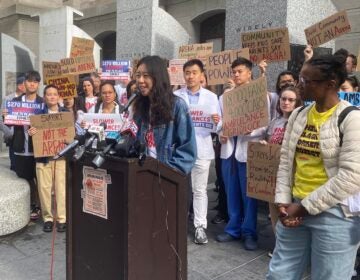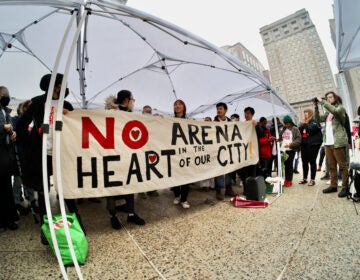Supreme Court moves up riparian hearing
April 2
By Kellie Patrick Gates
For PlanPhilly
The Pennsylvania Supreme Court has responded to SugarHouse Casino’s request to move up oral arguments the Court scheduled to help it determine who can issue permits to build on lands beneath the Delaware River and whether a permit the city gave SugarHouse, then revoked, remains valid.
The session is slated for April 15 in Philadelphia. The casino’s developer would like to know whether it has the submerged lands permit needed to build its planned project before it spends $70 million to purchase the Delaware Avenue property on which it hopes to build, court documents say, and they are scheduled to close on the property right around the originally scheduled May 12 hearing.
Delays cost SugarHouse more than $1 million per month, but they are not just bad for SugarHouse, its attorneys argue in the filing. The delays also “impede and frustrate” economic growth, new jobs, tax relief, and school funding, among other things. SugarHouse asked the Court to move the hearing to this month – either via a special session in Harrisburg, or by adding the case to its already set Philadelphia session.
But attorneys for a cadre of state legislators who represent Philadelphia’s riverwards filed a response to SugarHouse’s request, saying that any straits SugarHouse finds itself in are of its own doing, and the Court should not change its schedule to help the developer.
“This appeal is the direct consequence of HSP’s attempt to construct a casino complex upon land it neither owns nor controls,” they write. SugarHouse told the Gaming Control Board that it could build the project even without the right to build on riparian lands, the response states, and then SugarHouse chose to take a “short-cut” by seeking a city license to build on the land. “Careful and considerate examination of the legality of that short-cut is necessary as the license granted to HSP presents significant issues regarding the disposition of land held in trust by the Commonwealth of Pennsylvania for its residents,” the filing states.
The legislators’ attorneys also claim that SugarHouse is obligated to purchase the land under an agreement it made with the current owner, and since that agreement stands whether or not the casino has riparian rights, the date of the hearing is irrelevant.
Whenever the session is held, the arguments could get quite complicated:
SugarHouse attorneys will argue that they hold a valid permit, because the city had the right to grant it, but not the right to revoke it. “We are thankful to the court for granting our request and look forward to the chance to present our case. We have an agreement with the property owner to purchase the land,” said spokewoman Leigh Whitaker. “We have contractual obligations under the agreement that may be impacted by the Court’s ultimate decision. With that said, the terms of our agreement with the property owner are confidential, and as such, I am not at liberty to disclose any additional information.”
Attorneys representing City Council and the contingent of state legislators will say that the permit was never valid, because only the General Assembly has the power to grant a submerged lands permit to a project the size of SugarHouse.
And, based on previous conversations with Mayor Michael Nutter and others in his administration, the City will argue that while it has the power to grant submerged lands permits, the process that led to SugarHouse’s permit was flawed, so it also has the right to revoke that one.
This case stems from a Nov. 27 Philadelphia Commerce Department decision in which then-director Stephanie Naidoff issued SugarHouse a submerged lands permit that the casino needs to build its project as currently designed.
The right to build on these submerged, or riparian, lands had most commonly been granted through an act of the state legislature, and the legislature maintains that except in special circumstances involving small projects, they are the only body that can grant riparian rights. But no legislator was willing to sponsor a bill for SugarHouse.
Then in October, SugarHouse attorneys found something they said proved the casino didn’t need a legislative sponsor – a century-old law giving the city’s Commerce Department the power to grant riparian rights within the city limits. The solicitor under former mayor John Street (a staunch supporter of casinos in Philadelphia) agreed with SugarHouse’s interpretation, and the Commerce Department held its November hearing and ruled for SugarHouse.
In December, the contingent of state legislators who represent Philadelphia’s riverwards – including Sen. Vincent Fumo and Rep. Michael O’Brien – filed a lawsuit against the city and its commerce department. They argued that the old law cited by SugarHouse and the Street administration was superceded by new laws, including the 1978 Dam Safety and Encroachments Act, and the legislature has the exclusive power to grant riparian rights for a project as large as the proposed casino. City Council also filed with the Court, making similar arguments.
The waterfront legislators’ filing states that no entity has received riparian rights through City Council since the passage of the 1978 act.
Nutter, who has been critical of SugarHouse’s proposed riverfront site, began a review of all casino-related decisions shortly after he took office in January, and before the month was through, he revoked SugarHouse’s submerged lands permit. Nutter said the process was flawed – but he agrees with SugarHouse and the Street administration that the city has the right to issue the permits.
The administration said SugarHouse could appeal, and essentially go through the process again. SugarHouse instead filed with the court, arguing that the new administration did not have the right to overturn a decision made by the previous one.
Contact the reporter at kelliespatrick@gmail.com.
Read the Supreme Court Order and SugarHouse’s request to expedite oral arguments:
WHYY is your source for fact-based, in-depth journalism and information. As a nonprofit organization, we rely on financial support from readers like you. Please give today.






